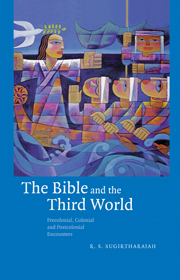Book contents
1 - Before the empire: the Bible as a marginal and a minority text
Published online by Cambridge University Press: 02 December 2009
Summary
The Way had not, at all times and in all places, the selfsame name; the sages had not, at all times and in all places, the selfsame human body. (Heaven) caused a suitable religion to be instituted for every region and clime so that each one of the races of mankind might be saved.
Seventh-century Chinese Imperial RescriptIf all this be true, how is it that God waits over sixteen hundred years before giving us any knowledge of it; how is it that the Chinese are left out, and only the barbarians are mentioned?
The Emperor K'and-hsiAs discussed in the introduction, there are three key junctures at which the Bible reached the Third World – precolonial, colonial and postcolonial. This chapter aims to describe the first phase of its arrival in Asia and Africa. In doing so, it will chart the reception and appropriation of the Bible in these continents.
Asia and Africa have close links with biblical Christianity. Africa's connection with the Bible is celebrated in famous courtly and common people who figure in the biblical narratives. These include royal personnages such as the Queen of Sheba; the Ethiopian Eunuch; Ebedmelech, another Ethiopian royal (Ebedmelech = son of a king), who helped Jeremiah out of a water tank; and other ordinary people such as Simon of Cyrene who bore the cross and came from North Africa (Luke 23.26). Asia, too, has its claim to biblical connections.
- Type
- Chapter
- Information
- The Bible and the Third WorldPrecolonial, Colonial and Postcolonial Encounters, pp. 13 - 42Publisher: Cambridge University PressPrint publication year: 2001

